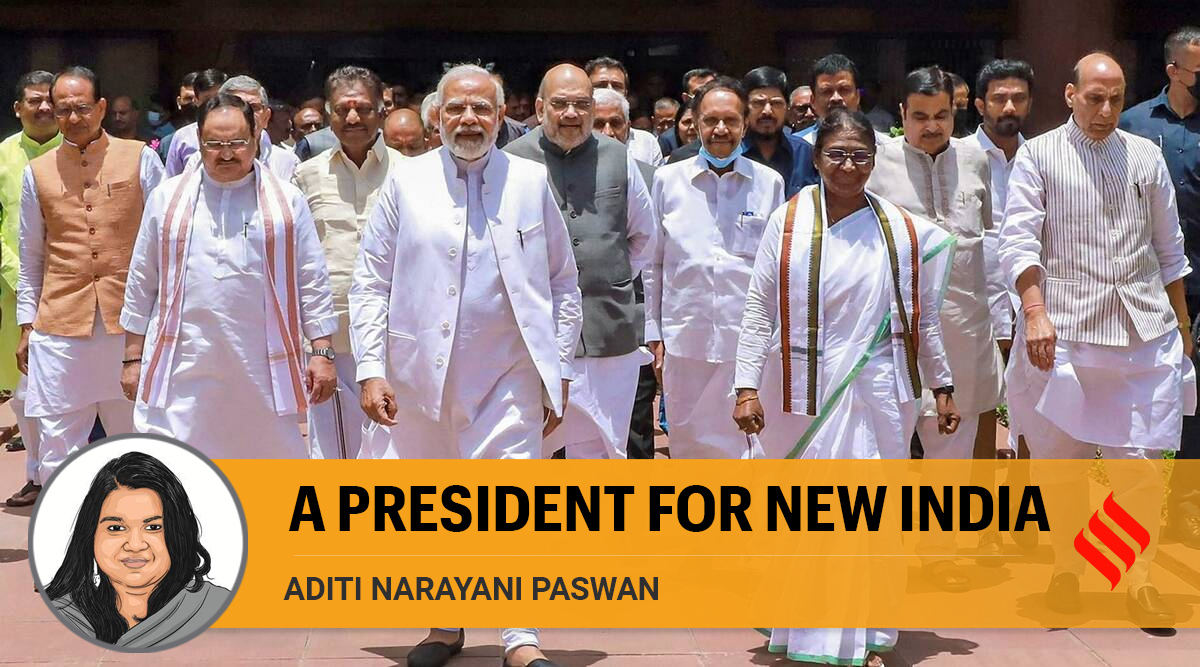A powerful photo has been doing the rounds of social media, showing a tribal woman, who has been nominated for the post of the President of India, walking with the mighty men of Indian politics. This poignant picture has inspired many young women from marginalised communities, like me, to dream big. Droupadi Murmu is not just a source of inspiration for us; her life and struggle, determination and success in the face of great odds represent the hope and promise of New India.
Under the leadership of Prime Minister Narendra Modi, Indian democracy has become more representative and inclusive. The BJP represents the New India of prosperity, equality and socio-economic mobility, reflecting the true embodiment of samajik samarasta (social harmony). A tribal woman succeeding a Dalit to the highest constitutional post of the nation is a remarkable testimony to the deepening roots of Indian democracy. Her nomination is transformational in its true sense.
 Opinion | Droupadi Murmu’s nomination: The political message
Opinion | Droupadi Murmu’s nomination: The political message
B R Ambedkar’s idea of synthesis and the representation of women in politics have become a reality. Born in 1958, Murmu is from the Santhal tribal community in Odisha’s Mayurbhanj district. The Santhals are known for their courage. In 1855, they revolted against the Permanent Settlement of Bengal introduced by Lord Cornwallis in 1793. Murmu, too, has shown great grit and courage in her life, having fought many battles for the empowerment of the marginalised. She was a teacher and joined the BJP in 1997. She was a minister in Odisha and the governor of Jharkhand between 2015 and 2021. Her political efficacy and electoral acumen have helped push the politics of the marginalised from the edges of tokenism to the mainstream. Her nomination for the post of President of India by the BJP signifies the party’s sustained efforts to incorporate tribal communities, both politically and culturally.
PM Modi’s personal signature on the decision is unmistakable and is in line with his relentless efforts to expand the BJP’s social base and achieve the ideals of social cohesion and justice. The party has expanded its electoral base among all social groups and communities, with marginalised groups being accommodated with dignity and pride and not just for the sake of social engineering and tokenism.
Most Read 1Chandrayaan-3 mission: Dawn breaks on Moon, all eyes on lander, rover to wake up 2As Indo-Canadian relations sour, anxiety grips Indian students, residents who wish to settle in Canada 3Karan Johar says Sanjay Leela Bhansali did not call him after Rocky Aur Rani: ‘He’s never called me but…’ 4Gadar 2 box office collection day 40: Hit by Shah Rukh Khan’s Jawan onslaught, Sunny Deol movie ends BO run with Rs 45 lakh earning 5Shubh’s tour in India cancelled: Why is the Canada-based singer facing the music?Political Pulse | Droupadi Murmu and future of democracy to youth angst to Justice Chandrachud at King’s
Murmu comes from a humble background and has faced much hardship in her life. In a February 2020 interview, she spoke about her political journey: “I started as a teacher without pay and later worked with social organisations to uplift villagers hailing from the remotest parts of Odisha.” She has defied great odds and much cultural stigma to serve the people, battling the many stereotypes generally associated with a career in politics. At an early age, she lost her husband, brother and mother, and in 2009 and 2013 she lost her two sons, leaving her devastated and depressed. At that juncture, she held onto the spiritual path with the Brahma Kumaris, practising yoga and meditation. Doing social service was her life’s new life mission. She is a fighter and has become a source of inspiration for many.
Due to the lack of women in positions of power at the local, state and national levels, girls and women don’t have many role models. Should Murmu become the First Citizen, it would not only give hope to the marginalised, but also to the many women who are considered second-class citizens. For me, her nomination goes beyond the politics of representation and tokenism. I have a role model now.
Also ReadWill reservation really help Indian women?Pratap Bhanu Mehta writes on new Parliament: India’s age of ambitionValues Kota imparted: Anxiety and building a future on a butchered presentWith G20-IMEC plan, the global order shifts to Eurasia
The writer is assistant professor, Maitreyi College and founder of DAPSA (Dalit Adivasi Professors and Scholars Association


